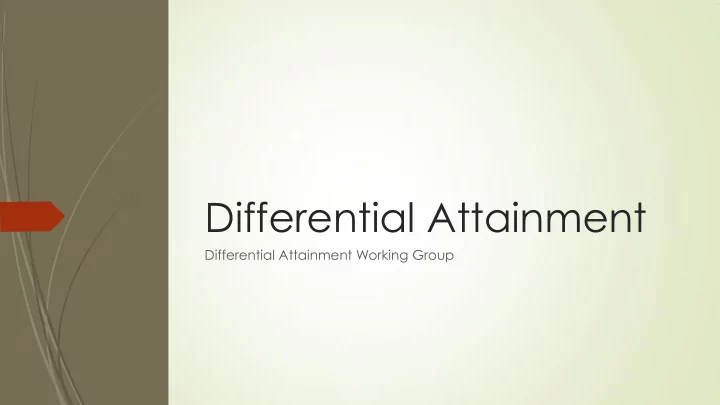

Differential Attainment Differential Attainment Working Group
Intended learning outcomes Define Define Differential Attainment Identify Identify some of the causal factors Implement Implement a strategy in your own organisation
Describes the variations in levels of educational achievement that Not specific to occur between medical education different demographic groups undertaking the same assessment Definition of Concerned with differential Recognised since the ‘race’ as a protected 1990’s characteristic attainment (DA)
Age Disability Gender assignment Marriage and civil partnership Pregnancy and maternity Protected Characteristics Race (Equality Act 2010) Religion and belief Sex Sexual orientation
Scotland’s Trainees Ethnicity & Country of PMQ
Pass Rates for All College Exams 2013/2014 and 2014/2015
Pass Rates for Each College Exam 2013/2014 and 2014/2015 100% 90% 80% 70% 60% 50% 40% EEA - BME 30% EEA - White IMG - BME 20% IMG - White 10% UK - BME UK - White 0%
Unsatisfactory ARCP Outcomes From 2009/2010 to 2014/2015 30% 25% 20% EEA_BME EEA_White IMG_BME 15% IMG_White UK_BME UK_White 10% 5% 0% NHS Education for Scotland Benchmark 1: UK Benchmark 2: deanery/LETB
BAPIO – action against RCGP and GMC over lower pass rates for IMG and BME candidates (2013) perceived to be due to racial discrimination Failing in their public sector equality duty Judicial hearing 2014 – Justice Mitting gave ruling RCGP not neglected its public sector equality duty BUT RCGP should act to reduce identified differences
Poorer recruitment performance Poorer relationships with seniors DA in Poorer ARCP Outcomes Postgraduate trainees Poorer exam pass rates
Groups with PMQ from overseas have a lower proportion of successful outcomes than UK graduates How do trainees White cohorts have a higher progress proportion of successful through key milestones outcomes compared to BME during training cohorts - GMC
In GP ARCP (2014/15) - 10.3% of outcomes awarded to IMG doctors rated unsatisfactory. UK graduates - 3.5% of ARCP outcomes were unsatisfactory. As a group, UK-BME doctors received higher proportions of unsatisfactory outcomes than UK-white ARCP doctors - 2010/11 to 2014/15 OUTCOMES In core psychiatry training for example, 7.0% of ARCP outcomes awarded to UK-white doctors were unsatisfactory for reasons other than exam failure. In comparison, 10.1% of ARCP outcomes awarded to UK-BME doctors were unsatisfactory
The average pass rate UK-white doctors was 75.8% and 74.8% in 2013/14 and 2014/15 respectively. The average pass rate UK-BME doctors in the same years was 63.4% and 63.0% Exam More affluent groups tend to be outcomes dominated by white doctors and BME doctors make up a greater proportion for UK of most deprived quintile graduates White doctors outperform BME doctors in exam attempts even when comparing individuals from the same socioeconomic background
Group Exercise
What factors do you think contribute to differential attainment?
Complex Poorly understood Causes Multi-factorial
Potential Causative Factors Meso – medical Macro – political Micro – individuals, school, training agendas, activity groups of students, context, working around high stakes doctors, examiners environment exams
Students experiences of learning, teaching and assessment (curriculum) Relationships that underpin students experiences -student-student Causal Explanations (Mountford- -student/staff Zimar et al) • Psycho-social and identity factors -staff expectations of students
Group Exercise
Now that you know some factors which may influence DA, what could you do in your own institutions (as individuals/groups) to overcome some of these factors?
Learning a new Trainee-trainer Lack of work relationship belonging environment Lack of social Experience of Lack of support networks prejudice Challenges Language Stereotyping difficulties (negative) Difficulties Settling in a new securing training country positions
Acknowledging Quality of problems and educational raising supervision awareness Knowledge of Individualised different types training and GMC of support and support feedback Workshop (May 2015) Improved recruitment Early detection selection and screening
What is happening currently? Task and Finish GMC Pilot involving Group of Speciality Trainee Focus 1 day conference 3 Deaneries Groups planned by Advisory 14 th November including Scotland NES Committee of 2018 Deanery RCGP
What can be done to tackle DA? Building positive trainee-trainer relationships Building trainee skills and confidence to deal with perceived/actual bias (empathy, showing belief in them) Facilitating mixed support (help combat fears of bias) Improving trainee well-being by enabling trainees to gain support outside work and de-stigmatising support in work
GP STEP Trainer support programme – for difficult extend to conversations other specialties New IMG Reverse Scotland enhanced mentoring induction deanery – proposed New interventions Unconscious approach to bias training mandatory E&D training
Trainee role Awareness modelling – raising – at New Chief Resident Trainer courses Development of national ppt Support for OOP Scotland slide set – for use for IMGs by all groups deanery Support for MTI fellows – enhanced induction
DAWG-TIQME action plans Focus groups arranged (IMG and BME) Reverse mentorship What Unconscious Bias training Scotland is doing Role modelling about it? Web resource for IMGs
Educational Learning governance environment and and culture leadership Scotland deanery action Supporting Supporting learners educators plan
Zero tolerance discriminatory Positive messaging Learning attitudes and environment behaviour and culture
IMG and BME trainee involvement in design of interventions e.g. chief resident Learning from previously Reverse mentorship disadvantaged pilot groups e.g. women in medicine Educational governance and Proactive support New approach to for trainees around mandatory E&D leadership visa issues training Gathering ethnicity & PMQ data on trainers
Supporting learners Role modelling, BME representation on trainee forums Buddying and mentorship GP STEP programme Foundation School IMG induction day Facilitate near peer support
Supporting educators Coaching for Mitigating Unconscious trainers – difficult stereotype bias training conversations threat
Differential attainment – BMA video https://www.youtube.com/watch?v=pOZD0nZ22T0
References Fair Pathways for All: Understanding experiences of progression – Katherine Woolf et al Understanding Differential Attainment across medical training pathways: a rapid review of the literature – Regan de Bere et al How do trainees progress through key milestones - GMC
Thank You Questions
Recommend
More recommend